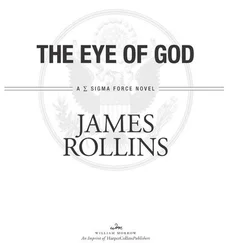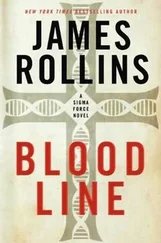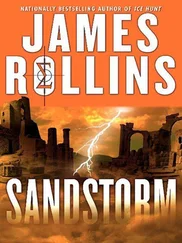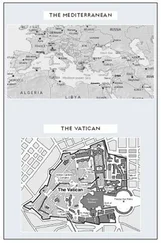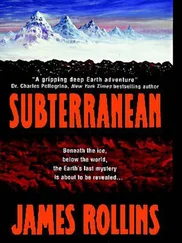The tunnel was a mere shaft bored through the ice. Rubber mats lined the floor to aid in climbing through it. Conduits shared the space, running along both walls.
After five yards, the tunnel suddenly darkened. Matt peered over his shoulder. Greer had pulled the hatch in place, hopefully hiding their retreat or at least delaying its discovery. This fourth level was large and broken into many compartments. The Russians would lose time, hunting through the level; hopefully they’d miss the loose hatch for a while.
The way became darker — and colder.
Finally the chute dumped into some old service cubbyhole. It was merely a cube cut out of the ice. A few pieces of wooden furniture crowded the space, along with spools of conduit and copper wire, stacks of spare metal plates, a thick rubber hose, and a tool trunk.
A ladder, just wood rungs pounded into one of the ice walls, climbed to another shaft twenty feet above.
Bratt pointed the rolled sheaf of his schematics. He kept his voice low. “That should lead to the third level. They stairstep up, one level at a time.”
Washburn studied the next tunnel. “We might be able to make it to the old weapons locker on the third level. It’s in the main section of the station, but if the Russians’ attention were distracted for a moment, a small team might be able to reach it.”
Bratt nodded. “Up,” he ordered.
Surgical tools were pocketed in order to free hands. The group mounted the ladder in the same order as before. Matt followed Amanda. He reached the top and pulled himself into the next service shaft.
A shout sounded behind him. Russian. It came from down the tunnel to the lab on Level Four.
“Damn it,” Greer growled.
The Russians had already found their rabbit hole.
A shot rang out. The slug ricocheted down the shaft and rebounded into the cubbyhole. Ice blasted as the bullet struck the wall, inches from where Washburn climbed the ladder.
Matt reached down and helped haul her up. Nimble as a cat, Washburn slipped past him. “Get the others moving faster,” he urged her.
No further prompting was needed. Everyone in the chute had frozen at the rifle blast, but now they hurried away, Bratt in the lead.
A new commotion echoed down to them. Mumbled orders in Russian. They were hard to discern. Matt’s ears were still ringing, but he didn’t like the furtive tone of this new speech.
Matt leaned over the tunnel opening. “Get your asses up here!” he hissed down to the last two men. They had both splayed themselves against the walls to either side, wary of further gunshots.
Greer leaped to the ladder first, flying up like a monkey. Pearlson was at his heels, practically crawling up his partner’s legs.
Matt grabbed the loose hood of Greer’s parka and dragged the man to him, then shoved him after the others.
Pearlson had one hand on the lip of the service shaft. Matt turned to help him next. Over the seaman’s shoulder, he saw a black object bounce into the room below.
Matt’s eyes widened with horror. It looked like a matte-black pineapple.
Pearlson must have been looking at Matt’s face at that moment. “What…?” He glanced back over his own shoulder.
The black object danced on the ice, striking the wall at the base of the ladder.
“Shit!” Pearlson said, staring up at Matt.
Matt lunged out and grabbed the seaman’s hood.
Pearlson knocked his arm away and leaped up, covering the shaft’s opening with his own torso. “Go!” he wailed in grim terror.
Matt fell back as the grenade exploded. The concussion knocked him farther back. The flash of brightness blinded him. He felt a wash of heat over his face and neck. He surely screamed, but was deaf to it.
The flash died away immediately, but not the heat — it grew more intense.
The source became horribly clear as Matt’s vision blinked back.
Pearlson still blocked the exit, but his clothes were on fire. No, not his clothes — his entire body.
It had been no ordinary grenade, but an incendiary device, exploding with liquid fire.
Pearlson’s body tumbled backward as the end of the shaft melted toward Matt, the rubber matting bubbling. He backpedaled away. His face and neck felt sunburned. If Pearlson hadn’t shielded the chute, they all would’ve been parboiled inside. The residual heat still felt like an open oven. The ice turned to water, dripping all around.
The Russians must have known they ran a good chance of losing the escapees in the warren of service tunnels and chutes. Their ploy had been brutal and swift. The grenade would either kill them or flush them out.
A hand grabbed Matt’s shoulder.
It was Greer. The lieutenant stared unblinking toward the melted ruins. “Move it.”
Matt’s ears still throbbed. He barely heard the man, but he nodded.
Together they crawled after the others.
But where could they go? Death lay either way. The only question remaining was the method of their demise. Matt stared ahead, then behind.
Ice or fire .

APRIL 9, 2:15 P.M.
USS POLAR SENTINEL
The group of men and women awaited Captain Perry’s order. The Polar Sentinel hung at periscope depth under an open lead between two ice floes. Winds wailed just feet overhead, blasting at sixty miles per hour across the open plains, but here, submerged, it was deadly quiet.
Perry turned to the radioman, a freckle-faced petty officer, who looked as pale as the white sheaves of paper in his hand. “And there remains no expectation of satellite contact?” Perry asked.
The twenty-two-year-old radioman swallowed hard, but he bore the heavy weight of the group’s gazes. “No, sir. The magnetic storm is fiercer than the blizzard above. I’ve tried every trick I could think of.”
Perry nodded. They were still on their own. The decision could not be put off any longer. Half an hour ago, the same radioman had rushed into the conn. He had picked up a message in Russian over the UQC. The underwater phones, while convenient for communicating short distances, offered no privacy, especially to a boat equipped like the Sentinel . The small submarine was not only fast and silent, but it had the best ears of any vessel in the sea.
Sailing twenty miles away, they had intercepted the vague sonar communication between the Russian team’s leader and the captain of the Drakon . Their shipboard translator had made short work of the brief exchange. Perry had listened to the recording himself, heard the cold, hollow voice issue the order.
Ignite the buried charges. Melt the entire base into the ocean .
The Russians intended to lay waste to everything. The civilians, the remaining soldiers…all would be sacrificed, burned off the ice cap.
Upon hearing this, Perry had immediately ordered the helm to find someplace to raise their antenna. Even though it was doubtful anyone could still respond in time, an emergency Mayday had to be sounded. The timetable was too short.
But even this feeble effort had met with failure. Fifteen minutes ago, they had surfaced in a thin lead, hummocked by snowbanks on either side. The antenna array had been sent up into the topside blizzard, and the radioman went to work. But it was no use. Communications were still down.
Dr. Willig stepped forward now. The Swedish oceanographer had become the spokesman for the civilians aboard. “Those are our people over there, our colleagues, our friends, even family. We understand the risk involved.”
Perry studied the faces around him. His crew, manning their respective stations, wore expressions just as determined. He turned and climbed the step up to the periscope stand. He took a moment to weigh his own motivations. Amanda was over there…somewhere . How much of his judgment now was skewed because of his feelings for her? How much was he willing to risk: the crew, the civilians under his protection, even the boat?
Читать дальше



